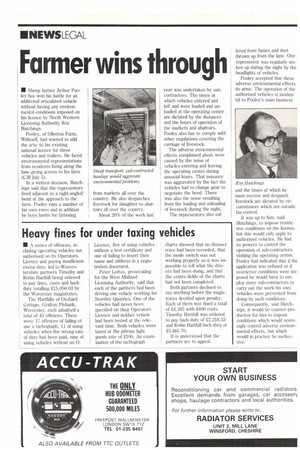Farmer wins through
Page 15

If you've noticed an error in this article please click here to report it so we can fix it.
• Sheep farmer Arthur Pooley has won his battle for an additional articulated vehicle without having any environmental conditions imposed on his licence by North Western Licensing Authority Roy Hutchings.
Pooley, of 011erton Farm, Withnell, had wanted to add the artic to his existing national licence for three vehicles and trailers. He faced environmental representations from residents living along the lane giving access to his farm (CM July 5).
In a written decision. Hutchings said that the representors lived adjacent to a right-angled bend at the approach to the farm. Pooley runs a number of his own ewes and in addition he buys lambs for fattening from markets all over the country. He also despatches livestock for slaughter to abattoirs all over the country.
About 20% of the work last year was undertaken by subcontractors. The times at which vehicles entered and left and were loaded and unloaded at the operating centre are dictated by the distances and the hours of operation of the markets and abattoirs. Pooley also has to comply with other regulations covering the carriage of livestock.
The adverse environmental effects complained about were caused by the noise of vehicles entering and leaving the operating centre during unsocial hours. That nuisance was aggravated by the fact the vehicles had to change gear to negotiate the bend. There was also the noise resulting from the loading and unloading of livestock during the night.
The representors also suf fered from fumes and dust thrown up from the lane. One representor was regularly woken up during the night by the headlights of vehicles.
Pooley accepted that these adverse environmental effects do arise. The operation of the authorised vehicles is incidental to Pooley's main business and the times at which he must receive and despatch livestock are dictated by circumstances which are outside his control It was up to him, said Hutchings, to impose restrictive conditions on the licence, but this would only apply to authorised vehicles. He had no powers to control the operation of sub-contractors visiting the operating centre. Pooley had indicated that if thc application was refused or if restrictive conditions were imposed he would have to employ more sub-contractors to carry out the work his own vehicles were prevented from doing by such conditions.
Consequently, said Hutchings, it would be counter-productive for him to impose conditions which would seemingly control adverse environmental effects, but which would in practice be ineffective.




























































































